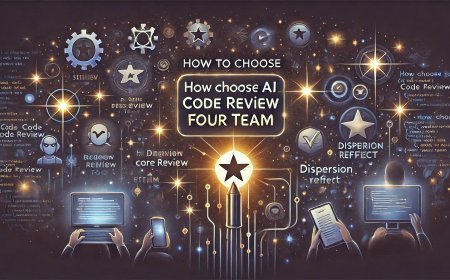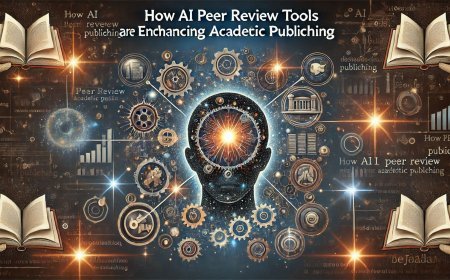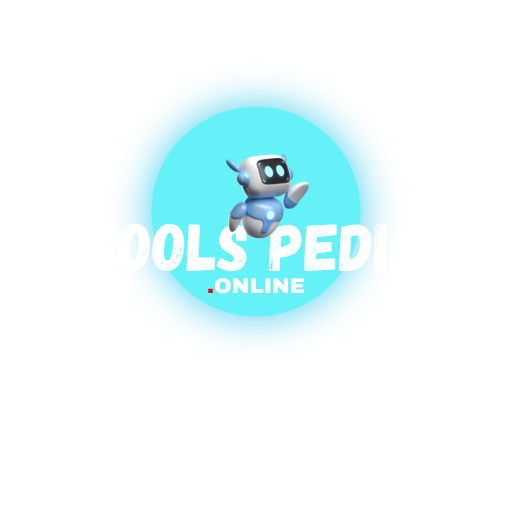Best AI Tools for Research: A Comprehensive Guide
The article "Best AI Tools for Research" in ToolsPedia is an in-depth guide to the best AI-powered platforms for researchers. It focuses on tools that make tasks such as data analysis, literature review, citation management, and content generation easier, saving time and increasing productivity for the researcher.

In today's fast-paced academic world, we're seeing a revolution in how researchers work. The best AI tools for research are changing the game, making it easier to sift through mountains of data and come up with new ideas. As someone who's been in the trenches of academic research, I can tell you that these tools are a game-changer. They're not just nice to have – they're becoming essential for staying on top of your field and pushing the boundaries of knowledge. We'll take a deep dive into the top AI assistants that can help streamline your research process. From tools that can analyze documents in seconds to AI-powered search engines that uncover hidden gems in academic literature, we've got you covered. We'll also look at how to pick the right AI tool for your specific needs, because let's face it, not all research is created equal. Whether you're writing a paper, doing a literature review, or just trying to stay up-to-date in your field, there's an AI tool out there that can give you a leg up. So, let's jump in and explore how these cutting-edge technologies can supercharge your research.
Top AI Assistants for Research
In the realm of academic research, AI tools have become indispensable for streamlining workflows and enhancing productivity. Let's explore some of the best AI tools for research that are revolutionizing the way we approach scholarly work.
ChatGPT
ChatGPT has emerged as a game-changer in the academic world. This AI-powered chatbot, developed by OpenAI, offers human-like responses to text inputs, making it an invaluable asset for researchers. Its ability to understand complex queries and provide detailed answers has made it a go-to tool for many academics. One of ChatGPT's strengths lies in its versatility. It can assist with various aspects of research, from brainstorming ideas to organizing thoughts and generating titles. It's particularly useful for non-native English speakers, as it can help improve the readability of drafts and accelerate the submission and publishing process. However, it's crucial to approach ChatGPT with caution. While it can be a powerful aid, it's not without limitations. The tool may sometimes produce biased or inaccurate information based on its training data. Therefore, researchers must verify the information provided and use it as a starting point rather than a definitive source.
Perplexity AI
Perplexity AI is another innovative AI-driven platform that's making waves in the research community. This advanced search engine provides accurate and relevant results through natural language queries, making it an excellent tool for academic research. What sets Perplexity AI apart is its ability to deliver concise and contextual answers, often including citations and sources to enhance reliability. This feature is particularly valuable for researchers who need to quickly find and verify information from reputable sources. Perplexity AI excels in real-time information retrieval, ensuring users get the most current and relevant data available. Its robust citation and source tracking allow users to trace the origin of the information provided, which is crucial for academic integrity.

Hugging Face
Hugging Face has become a central hub for the machine learning community, offering a vast repository of models, datasets, and applications. With over 850,000 public models and around 50,000 new ones added monthly, it's a treasure trove for researchers in AI and related fields. One of Hugging Face's standout features is its ability to host and run models on various hardware options, including GPUs. This flexibility makes it an excellent platform for researchers who need to experiment with different models or run computationally intensive tasks. Hugging Face also offers tools for data visualization and exploration, which can be invaluable in the early stages of research. Features like semantic search and feature-rich filtering can help researchers gain deeper insights into their datasets. In conclusion, these AI assistants are transforming the landscape of academic research. By leveraging tools like ChatGPT, Perplexity AI, and Hugging Face, researchers can enhance their productivity, streamline their workflows, and potentially uncover new insights in their fields of study. However, it's crucial to use these tools judiciously, always verifying information and maintaining academic integrity in the research process.
AI-Powered Document Analysis Tools
AI-powered document analysis tools have revolutionized the way researchers interact with complex academic papers. These tools leverage advanced algorithms to simplify the process of understanding and extracting valuable insights from research documents. Let's explore some of the best AI tools for research that are making waves in the academic world.
Explainpaper
Explainpaper is an innovative AI-powered platform designed to simplify the comprehension of complex research papers. This tool allows users to upload academic papers in PDF format and receive clear explanations for difficult sections. By highlighting confusing text, users can get straightforward explanations that break down complex concepts into simpler terms. One of Explainpaper's standout features is its ability to generate AI-powered explanations for highlighted text, saving researchers valuable time when reading through dense academic papers. The tool also allows users to ask follow-up questions, fostering a more interactive and engaging reading experience. While Explainpaper offers a free version with basic features, users can upgrade to paid plans starting at $12.00 per month to access more advanced capabilities. These include AI-generated summaries and the ability to analyze multiple papers simultaneously.
Humata
Humata is another powerful AI research assistant that's changing the game for academic research. This tool applies ChatGPT-like capabilities to files, allowing users to interact with their data using natural language. Researchers can ask questions about their documents and receive quick, easy-to-understand answers. One of Humata's key strengths is its ability to process various document formats, including PDFs, Word documents, and Excel spreadsheets. This versatility makes it an invaluable tool for researchers dealing with diverse types of academic materials. Humata offers a range of features that can significantly streamline the research process. These include the ability to create reports and presentations based on document information, accelerate learning processes by providing insights from files, and facilitate the synthesis of information by automatically generating new writing based on file content.
SciSpace
SciSpace is a comprehensive AI-powered platform that's making waves in the research community. This tool leverages AI to help researchers generate literature reviews and extract statistics by searching for academia relevant to specific questions. One of SciSpace's most popular features is 'Chat with PDF,' which allows users to analyze PDFs and receive answers backed by citations. The platform also offers an 'AI Writer' feature that uses AI to convert rough notes into comprehensive paragraphs, making it an excellent tool for academic writing. SciSpace goes beyond basic document analysis by offering features like 'Literature Reviews,' which helps researchers discover new papers, and a 'Citation Generator' that supports over 2,300 citation styles. These tools can significantly reduce the time and effort required for comprehensive academic research.

AI Search Engines for Academic Research
In the world of academic research, AI-powered search engines are transforming how we find and analyze scholarly literature. These tools are becoming essential for researchers looking to streamline their literature review process and uncover relevant studies more efficiently. Let's explore some of the best AI tools for research in this category.
Semantic Scholar
Semantic Scholar has become a go-to resource for many academics. This free AI-powered search engine offers a vast database of over 200 million research papers across various scientific domains. What sets Semantic Scholar apart is its ability to understand the context and meaning behind search queries, providing more relevant results than traditional keyword-based searches. One of Semantic Scholar's standout features is its use of AI to analyze and extract key information from papers. This allows researchers to quickly grasp the main ideas and findings without reading the entire document. The platform also offers tools for visualizing citation networks, helping users discover connections between papers and identify influential works in their field.
Elicit
Elicit is an innovative AI research assistant that's changing the game for literature reviews. This tool allows users to input research questions or upload example articles, and in return, it provides related questions, subject headings, and keywords to optimize database searches. This feature can be incredibly helpful in the early stages of research when you're trying to refine your focus and identify key terms in your field. One of Elicit's most powerful features is its ability to find relevant papers without requiring an exact keyword match. This can help researchers discover studies they might have otherwise missed using traditional search methods. Elicit also offers summarization features, extracting key takeaways from papers that are specific to your research question. While Elicit offers a free version with basic features, users can upgrade to paid plans for more advanced capabilities. The Pro subscription, for instance, provides 12,000 credits per month, which can be used for various research tasks.
ResearchRabbit
ResearchRabbit is a relatively new player in the field of AI-powered research tools, but it's quickly gaining popularity among academics. This tool uses data from Semantic Scholar to help users explore similar works and authors, creating a visual map of the research landscape. One of ResearchRabbit's unique features is its ability to generate visualization maps that show connections between publications or authors. This can be particularly useful for identifying research teams or uncovering relationships between different areas of study that might not be immediately apparent. ResearchRabbit also supports an unstructured searching workflow, which can be beneficial for researchers who are in the early stages of exploring a topic. The tool creates a linear trail of your search process, making it easier to backtrack and explore different branches of your research journey. In conclusion, these AI-powered search engines are revolutionizing the way we approach academic research. By leveraging advanced algorithms and natural language processing, tools like Semantic Scholar, Elicit, and ResearchRabbit are making it easier than ever to find relevant literature, uncover hidden connections, and streamline the research process. As these technologies continue to evolve, they're likely to become even more integral to the academic workflow, helping researchers to work more efficiently and potentially leading to new discoveries and insights.

Choosing the Right AI Research Tool
When it comes to selecting the best AI tools for research, there are several factors to consider. The right tool can significantly enhance your research process, while the wrong one might hinder your progress. Let's explore the key aspects to keep in mind when choosing an AI research assistant.
Factors to Consider
One of the primary considerations is aligning the AI tool with your specific research needs. Different tools excel in various areas, such as literature reviews, data analysis, or general research assistance. For instance, tools like Scite.ai can help automate literature reviews by identifying relevant studies and summarizing findings. On the other hand, platforms like Pitchwave allow for qualitative interviews and data analysis through AI-driven insights. It's also crucial to ensure that the AI tool integrates seamlessly with your existing workflow and infrastructure. Look for tools that offer intuitive interfaces and are compatible with various devices and platforms. This will minimize disruptions and allow you to benefit from AI-enhanced learning right away. Another important factor is the tool's ability to enhance critical thinking and creativity rather than replace human interactions. As Dan Fitzpatrick suggests, it's essential to outsource the "doing" but not the "thinking" to artificial intelligence. Choose tools that automate administrative or repetitive tasks, freeing up valuable time for deeper learning and problem-solving activities.
Evaluating Features
When evaluating AI research tools, pay close attention to their specific features and capabilities. For example, some tools offer real-time search capabilities, ensuring you have access to the most current information available. Others provide source citations, which is invaluable in academic and professional settings where the credibility of sources is critical. Consider tools that can handle diverse content types, from text and code to tables and math problems. This versatility can be particularly useful in multidisciplinary research projects. Additionally, look for personalization features that tailor responses based on user interests and search history, making your research process more efficient.
User Reviews
User reviews can provide valuable insights into the practical application of AI research tools. Look for feedback from researchers in your field or those working on similar projects. Pay attention to comments about the tool's accuracy, ease of use, and customer support. It's also worth noting that some tools offer free trials or have generous free plans. This allows you to test the tool's functionality and assess its fit for your research needs before making a commitment. Remember, the best AI tools for academic research are those that not only meet your current needs but can also scale with your research as it evolves.
Conclusion
The rapid evolution of AI tools has a significant impact on the landscape of academic research. These cutting-edge technologies are not just handy add-ons but are becoming essential to stay ahead in the field and push the boundaries of knowledge. From AI-powered search engines that uncover hidden gems in academic literature to tools that can analyze documents in seconds, researchers now have a wide array of options to streamline their work and boost productivity. As we look to the future, it's clear that AI will continue to shape how we approach research. However, it's crucial to remember that these tools are meant to enhance human capabilities, not replace them. The key to making the most of AI in research is to use these tools wisely, always verifying information and maintaining academic integrity. By doing so, researchers can harness the power of AI to unlock new insights, save time on routine tasks, and focus more on the creative and analytical aspects of their work. ## FAQs What are the top AI tools available for researchers? Several AI tools are highly recommended for researchers needing help with tasks such as annotation and citation. Some of the top tools include Semantic Scholar, ZAIA AI Assistant for Research, Tableau, Scite.ai, and Consensus AI. How is AI utilized in research? AI can be employed in research to collect, analyze, or access identifiable data about human participants. Additionally, AI tools can act as an extension of the researchers by interacting with potential, current, or past participants, providing them with necessary information. Which AI tool is best for summarizing research papers? Jasper AI stands out as a versatile tool for summarizing research papers. It enables the creation of high-quality summaries efficiently, helping researchers to simplify complex information into clear and concise summaries. Is it permissible to use AI for writing research papers? Yes, using AI to assist in writing research papers is acceptable as long as it involves original ideas and is not merely a case of copy-pasting. AI can be used to articulate and develop your own ideas, thus serving as a tool for assistance rather than a means of cheating.
What's Your Reaction?



































